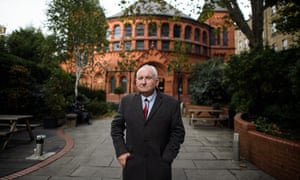Mo Gawdat
Former chief business officer for Google X and the author of Solve for Happy
In my late 20s I developed a massive temper. I remember vividly the moment when I found myself looking in the mirror crying because I didn’t want my daughter to see that person any more. My work is all about bringing logic to things that sometimes appear irrational. Anger is irrational behaviour that pops up at times, so I began to analyse it and to train myself.
The same biological rules apply to our brains as muscles – what you use grows. The more we allow ourselves to be angry, the more we are building a network of neurons that make it so much easier to be angry and so much more difficult to be happy. You need to develop the network that allows you to feel calm, compassionate and over time you develop what you need so anger doesn’t pop up unexpectedly.
By the time my son Ali left us, I was already where I wanted to be when it came to dealing with my anger. Many people know Ali left us due to human error – a surgeon made several mistakes in a row. The typical response you would expect is anger – revenge. But the training I did helped me – much as I love Ali and wish he was still with us, I realised no one deserves my anger.
The first step to managing anger is to acknowledge it. Sit with it. Treat yourself like a child that is a little emotional. It’s OK to feel that emotion – it’s not the emotion that destroys us or makes us, it’s what we do with it.
Second, look at your actions. A good skill level, a black-belt skill if you like, is to get angry, but control it. When you get angry are you going to explode at your daughter? Become hurtful? When you see that clearly a lot of things change. Emotion is expressed, but the response to it doesn’t have to get you into situations that are irreparable.
Third, ask what good is this bringing? I could have been raging at the doctors for the rest of my life. But would it bring Ali back?
Since I wrote One Billion Happy I get many grieving parents writing to me. I tell them you can get angry, but it’s not going to bring your child back. It’s just going to consume you. It’s going to inflame your emotions for the rest of your life, and neuroplasticity will make those parts of your brain stronger and send you on a path down to a very miserable life. Why would you want to do that to yourself?
Gina Miller
Business owner and activist

Having been through many traumas in my life including having a child with special needs and being a victim of domestic violence, I know that anger, revenge, any negative emotion is a waste of emotional, physical and intellectual strength and resilience. My life experiences have taught me to regard anger as running down energy that could be more usefully expended elsewhere.
Anger is one of the most important and influential emotions in human life and so it is in politics and campaigning. But anger management is vital in my view if you want to be effective. I worry about how quickly people in positions of power are getting angry. Countless psychological and behavioural science studies have shown that anger impairs decision-making and judgment. I also think that people in positions of power need to check their privilege and platform, as their behaviour and handling of anger sends a message to wider society.
I always try to ignore the tone, the anger, listen to the words and message and calmly address that; to enable a dialogue that dilutes the anger coming from the person opposite me. I try to keep clear of emotions and deal always in facts, to keep clear of personalising things and try not to use complex language that can make others feel that you are belittling them.
I know that is not the way to make headlines, but the fact is the debate we are having today is so important we can’t let anything get in the way. We are at a pivotal point in history. It is all too important for any of us to descend to that level. It is easy to be consumed by anger, but my advice is to resist and learn to use anger and bitterness to fuel change. Martin Luther King said “The supreme task is to organise and unite people so that their anger becomes a transforming force.” If not anger can be quick to destroy what we take years to build.
Jermaine Williams
Head of boxing and behaviour at the Boxing Academy

As a teen, when I got really angry it would be because I didn’t feel that my point of view was being listened to by adults. I’d leave the house and sit in a park to clear my head. That way things didn’t get dealt with, they just built up and eventually I ended up sofa-surfing and staying on night buses just to get away. I’d bottle everything up. Then, when I was 16, I had an angry stand-off in the street and assaulted someone. I was arrested and remanded to a young offender institution. I got bail after three months and was so sure I was going to be sent back I joined a boxing gym because I thought it would make me fight better! It saved my life.
To be successful in boxing you have to be calm, controlled and disciplined. It’s 80% mental, so control over your emotions is key. When I started boxing, I used to get angry when I got hit but my coach taught me to stay composed, relaxed and wait for my chance. Patience is important. If you lose your temper you lose the fight. Anger blinds!
When young people start with us they often have a negative view of adults, as well as themselves, arising from issues with trust. At the Boxing Academy we are like a family, we build relationships with them and help them work through their emotional issues. Daily training also helps with impulse control and stress relief; punching a bag is a great way to let off steam and a side-effect is improved mental health. It’s rewarding to see their journey from negativity to being confident, ambitious and optimistic. Boxing is a microcosm of life. It teaches you determination, problem-solving, discipline, hard work, humility, respect and how to be part of a team. If you apply those skills to any situation you can be successful.
Laura Bates
Writer and founder of the Everyday Sexism Project

When I was a child and a teenager, being shouted at by strange men in the street, enduring sexualised comments about my body, experiencing sexism in education and sexual assault in public places made me angry, but that anger was quickly subverted into shame, confusion and fear. I didn’t feel that anger was an acceptable response, because I didn’t see other people getting angry about these things. As I’ve grown older, and become more aware of feminist activism, I’ve started to understand that I have a right to be angry, and to focus that anger on the real perpetrators, resisting societal encouragement to turn it on myself.
For centuries, women have been taught that their anger is unfeminine, inappropriate and shameful. Angry women are seen as hysterical, overbearing or out-of-control, where angry men are often portrayed as assertive, confident leaders. So there is a potential untapped power in acknowledging and harnessing women’s rightful anger; we have every reason to be angry and it can be channelled very positively into advocacy for ourselves in the workplace, or political and social action, as the recent wave of Women’s Marches and feminist campaigns worldwide has shown.
Anger without action is what leads to a feeling of impotence and helplessness, so I try to make the people who have the power to take action as angry as I am. For example, when thousands of stories of school sexual assault made me furious, I focused my anger into a campaign for better sex- and relationships-education in schools.
Learning to be less afraid of anger has been a huge part of my work over the past decade, because the immediate knee-jerk response to feminist activism is often defensive anger from men. For me, being prepared to listen and give truthful answers, arming myself with as many facts and statistics as possible, has been a positive way to do that – particularly when I am working with groups of men in workplaces, or young men in schools. People get frightened if they think you’re attacking them, and that fear often manifests itself as anger. If you can show them that you’re talking about tackling a systemic problem, one that probably affects them as well, you can often relieve the tension and anxiety enough to make constructive progress.
John Bird
Crossbench peer in the House of Lords and founder of the Big Issue

I’ve had the best of all lives because I’ve been given the chance to turn my anger into something incredibly useful. I grew up in the London Irish underclass in the 60s. We weren’t the organised working classes and we fostered an enormous amount of displaced loathing and hate, as well as finding scapegoats for that rather than understanding it was systemic.
I remember when I was converted almost instantaneously, under the influence of those around me, from being a ragged little Englander into a revolutionary Marxist. Even though it was a conversion of me moving from reaction to progression, I can remember from that period on I was permanently angry at capitalism, Thatcherism, the miners strike, the shooting dead of civil rights protesters in Derry in 1972 … it goes on.
Anger is a brilliant initiator. If you don’t feel angry about the world you probably don’t want to change it. But if you stay angry you end up repeating yourself, becoming exasperated. I’m now 73 and have been active in politics since the 60s, I’ve seen generations of very angry people, then the next time you turn around they’re dissipated or broken by their own anger. And most of those who enter active politics never stay the journey. I think one of the reasons for this is that their anger isn’t refined enough – made into another substance.
With Extinction Rebellion – they’re very measured in what they’re doing. They’re not running around waving their fists – they know they can disrupt and bring to the fore that we’re not very grown up economically or philosophically about climate change – to me that’s a greater sign that they’ve tapped into what actually needs to be done next. The school strike too – these are not just people being angry, these are people that are being organised. If you don’t organise anger it won’t move on to a higher practice.
As a child, I always remember sitting by the gas oven and my mum would put water in and porridge in and tell me to stir it. I would think that stirring would last for ever, but at some point it would turn into porridge you could eat. It’s how I feel with anger – you’ve got to make it something thicker. You want it to be fuel for a rocket, not a gun.
Hugo Tagholm
Chief executive of Surfers Against Sewage

Anger and moral outrage have driven SAS since its inception in the 1990s. Back then sewage was on all our beaches, it was making surfers sick. What always sticks with you is finding animals, such as whales and dolphins, that may have come into contact with plastic pollution, washed up on the beaches of Cornwall. That injustice and the experience of pollution on these pristine beaches, really motivated those initial campaigners to create our organisation.
And that persists today. As people who live and breathe the ocean, we’re still spurred on by that outrage. It’s that visceral experience which remains core to our DNA and what makes SAS one of the most authentic environmental campaign groups. We know that the status quo isn’t good enough and we need radical change to preserve these environments. We’re not stuck behind a desk in the city – I’m possibly the only CEO in this sector that sees the ocean from my desk.
We’ve gone through a decade of a lot of collaboration and diplomacy but what we’re seeing with the climate strikes is a new frontier of activism akin to the 1990s, when people were chaining themselves to trees and the Surfers Against Sewage were taking to the streets of London with gas masks and surfboards. We’ve just seen more than 1,000 people arrested at Extinction Rebellion climate change protests in London. People are expressing anger. We have to listen to the best experts out there to inform our policy decisions. All we’ve seen so far is the rapid degradation of our environments.
Alexandria Villasenor
A 13-year-old climate activist and the founder of Earth Uprising

I get angry over injustice. I think a lot of young people do. It’s like we can naturally see when something is hurting someone, and so we speak out. As people grow up they look away and most of them don’t get angry anymore. I watched Greta Thunberg give her speech at COP 24, and everything she said was right. Then the adults, like, figuratively patted her on the head and kept right on burning fossil fuels. That made me angry, and that is when I decided to act on climate change. When I went on strike I didn’t understand what being an activist was. I just knew I was angry about what was happening to our planet.
I think anger is a big deal in my generation right now because there is a lot to be angry about. We live in a world with racism, gun violence, climate change, elitism and we have learned early in our lives that the world isn’t a kind place. We learned the world is a really selfish, mean place and that is making us angry.
There have been so many different responses to my strike [Alexandria has spent every Friday since December protesting outside the United Nations HQ in New York]. There are a lot of people who are supportive and encouraging and I really appreciate them. They keep me going. Then there are the climate deniers who are rude and mean, or people who aren’t climate deniers, but are still rude because they don’t think what I’m doing is the right thing to do about climate change – they think climate change can be fixed by the current system we have and that protesting isn’t necessary.
Then there are people who believe in climate change and think it’s a crisis, but they don’t think it’s appropriate that someone like me is taking a stand. They attack my age, my skin color, where I live, where I go to school and even my family. These are the only people that don’t make me angry. They make me feel hopeless because we should be focusing on what is happening with the planet, not the planet’s messengers. I don’t have the time to pay attention to the people who attack me, I have too much work to do.
Mo Amer
Standup comedian, his show the Vagabond is on Netflix, moamer.com

Experiencing war with a side of displacement at an early age is upsetting. The effects linger on for years and if not dealt with properly can be detrimental to one’s heart and soul. For me, discovering stand-up comedy at ten and starting to perform at 14 is how I dealt with the post traumatic anger of having to flee my home in Kuwait at the start of the Gulf War.
Stand up allows for the space to vent about whatever is going on deep inside your gut, though you have to be funny, that’s the rule. You can’t just be angry with no resolution. It’s important to be able to breathe through the anger and not let it get the best of you. Anger can be a great thing if you control it and you analyse where it’s coming from. Anger is not the way you make change. You have to let the anger fuel the intellect to then truly make a substantial shift.
My anger is deeply rooted with displacement and greed. Anytime I see a story of injustice for political or monetary gain, it hurts. I have a hard time processing the hurt humans are willing to inflict on others for little worldly gain. My experience of fleeing war has molded my entire life and has taught me to be thoughtful of other people’s space and to respect their boundaries.
For me, when I’m angry I get funnier; I deal with stress that way. It’s my natural reaction to immediately make a situation that’s difficult funny. It’s something I was born with and I have a hard time controlling the jokes spewing out in the most depressing or difficult situations.
For me, I have found engaging those who are prejudice and racist in a conversation, AWAY from others that are like minded as them, to truly be the most effective strategy. It just requires an open mind to get to a good place. That doesn’t mean it always works. Some people are just born to be dumb and ignorant. At which point, the only thing to do is…to walk away and let them destroy themselves. Just whatever you do, stay hopeful and don’t let their negativity stick on you forever.
Natasha Devon
Mental health, body image and LGBTQ activist, natashadevon.com

I’ve been visiting schools and colleges throughout the U.K. for more than a decade now and watched successive governments ‘promise’ to ‘prioritise’ children and young people’s mental health. After a lot of PR and bluster, all that seems to happen is that a greater burden is placed on already overstretched teachers whilst budgets in other areas of the public sector are cut. It’s so frustrating because awareness raising charity campaigns and celebrities are successfully urging young people to be more open about their mental health issues, yet when they do they often cannot access the help they need.
In children, particularly those who for whatever reason cannot articulate how they are feeling, emotional health difficulties often express themselves through angry outbursts. This is particularly (although not exclusively) true of boys – primary school aged boys are three times more likely to be diagnosed with a behavioural disorder, whereas girls are three times more likely to be diagnosed with an emotional disorder. My hunch is they’re the same thing.
I’m learning, through mindfulness and meditation, to observe my emotions. So when I feel myself getting angry I take a moment to ask whether I’m genuinely annoyed by what’s happening in the present moment or whether it’s pushing a pre-existing emotional ‘bruise’ from the past. If the latter, I remind myself that it isn’t being done on purpose. If I have to work with a person who’s making me angry I say ‘when you do this i feel this…’ which is a neutral and productive way of expressing my anger towards them and gives them an option to change their behaviour.
Generally, though, when I’m angry it’s on behalf of someone else, or a group of people, who has/ve been wronged. I realise I’m very privileged, I have various platforms upon which I can vent my spleen and I try to use them to draw attention to injustice – that feels like a good use of anger. And when all else fails, I go to the gym and punch a punch bag!
Richard Coles
Cleric, broadcaster and former Communard, richardcoles.com

Sometimes I wish punk would happen again, just to wake us up, reset and energise people and give them a sense that they can get a grip on the problems that affect their lives.
I love the anger so guilessly expressed by Greta Thunberg and I’m fascinated by Extinction Rebellion and how thoughtful directed anger can work in an effort to rally us in what is the defining issue of a generation. I completely support it – I had a very activist youth myself – I’ve been hit by the police during protests and once tried to storm parliament – but my life, way of thinking and existence now makes me the person who has a conversation, rather than hits the picket line.
When I was young, I can remember the fight for gay rights, particularly when HIV came along. It felt like a matter of life and death and I didnt feel like it was something that could be fruitfully solved through discussion. For me it was about being on the front line and refusing to accept something that was unjust, refusing to bowed.
But through activism I’ve noticed you have two equally important fronts – one is street challenge and the other is negotiation that might produce change. My movement over the years has been from the front line to the back room and I do miss the front line sometimes. It’s very vicarish, but now I would be seeking conciliation and to see if there’s a way of establishing common ground in which people who are at enmity can find a solution. There is stuff that outrages me…for example the way people who are poor suffer in this country, in my parish, as a result of poverty, neglect, poor housing. But I’m so used to that now that instead of being angry about it I try to do things that make it better.
I think it’s important to examine one’s anger critically; what is it that makes you angry why does it work? Try to be circumspect – understand why someone might have a different view. Be calm. If after that you conclude your outrage is appropriate then get together with other people and think of creative ways to challenge it. Sometimes it does mean the barricades or a confrontation but don’t just think of that. I’m signed up to a project where anger is quite firmly described to be a sin. So indulging anger is something I‘d always guard against.
• Interviews by Will Coldwell
Source: TheGuardian
